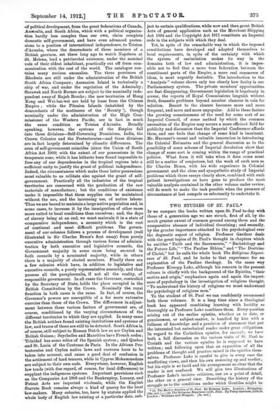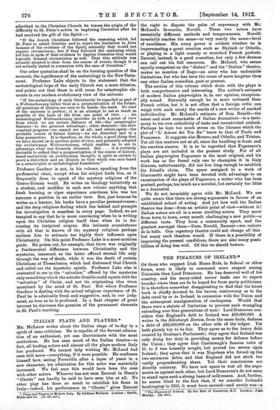TWO STUDIES OF ST. PAUL.*
IF we compare the books written upon St. Paul to-day with those of a generation ago we are struck, first of all, by the much greater extent of common ground among them and the comparative absence of individual theorizing; and secondly, by the greater importance attached to the psychological over the dogmatic aspect of religion. Professor Gardner deals with the great topics of St. Paul's thought in chapters which he entitles "Faith and the Sacraments," "Eschatology and the Future Life," "The Pauline Ethics," and "The Doctrine of Christ," but he calls the whole book The Religious Experi- ence of St. Paul, and he looks to that experience for an explanation of the Pauline theology. In the same way Professor Kirsopp Lake, although his concern in the present volume is chiefly with the background of the Epistles, "their motive and origin," emphasizes again and again the import- ance of psychology in the investigation of religions thought. "To understand the history of religions we must understand the psychology of religious men."
To the student of St. Paul we can confidently recommend both these volumes. It is a long time since a theological book has appeared combining learning with lucidity as thoroughly as Professor Lake combines them. Every question arising out of the earlier epistles, whether as to date, or genuineness, or subject-matter, is handled by him with a fullness of knowledge and a precision of statement that put the interested but untechnical reader under great obligations.
In regard to the Corinthian epistles, for example, we have both a full discussion on the various visits of St. Paul to
Corinth and the various epistles he is supposed to have
written ; and following upon that an exposition of all the problems of thought and practice raised in the epistles them-
selves. Professor Lake is careful to give in every case the
conflicting views, and then his own summing up and verdict ; but his style is so lucid and his arrangement so clear that the
reader is not confused. We will give two illustrations of Professor Lake's incisive criticism, one on a point of detail, the other on a general view. Describing the history of the struggle as to the conditions under which Gentiles might be • (1) ow Earlier Epistles of St. Paul. By Hirsopp Lake. London : Eivington. ads. net.]—(S) The Rei4ione Experience of St. Paul. By Percy Gardner, Lite.D. London • Williams and tiorgate. [Se. net.]
admitted to the Christian Church he traces the origin of the difficulty to St. Peter's action in baptizing Cornelius after he bad received the gift of the Spirit :—
"If the Jewish Christians followed the reasoning which led St. Peter to admit Gentiles and to reject the limitation to Jews because of the evidence of the Spirit, naturally they would not require circumcision ; but if they followed the reasoning which led him in spite of that evidence to baptize Cornelius they would logically demand circumcision as well. That this attitude was actually adopted is clear from the course of events, though it is not actually stated in connexion with the case of Cornelius."
Our other quotation shall be on the burning question of the moment, the significance of the eschatology in the New Testa- ment. Professor Lake objects to the statement that the eschatological hope of the early Church was a mere delusion, and points out that there is still room for catastrophic ele- ments in our modern evolutionary view of the universe.
"If the eschatology of early Christianity be regarded as part of a Weltanschauung rather than as a prognostication of the future, all questions of illusion are seen to be beside the mark. No view of the universe is perfect ; it is an attempt to see as much as possible of the facts of life from one point of view. . . . An eschatological Weltanschauung provides us with a point of view from which we see certain features of life—the catastrophic features—to the greatest advantage ; other elements—the slow constant progress—we cannot see at all; and others again—the probable course of future history—we see distorted and in a false perspective. It is therefore, on the whole, a good thing that we have moved on to another point of view, and generally adopted the evolutionary Weltanschauung, which enables us to see to advantage what was formerly obscured. But . . . it is certainly desirable to reflect that a prognostication of the course of history, based exclusively on evolutionary thought, is quite as certain to prove a distortion and an illusion as that which was once based on a catastrophic or eschatological foundation."
Professor Gardner is not, in his volume, speaking from the professorial chair, except when his subject leads him, as it frequently does, to speak of the mystery religions of the GrEeco-Roman world. He writes on theology tentatively as a student, and modifies in each new volume anything that fresh learning or riper experience convinces him was too extreme a position in an earlier view. But, just because he writes as a learner, his books have a peculiar persuasiveness ; and the deep religious feeling which lies behind and prompts his investigation is manifest in every page. Indeed, we are tempted to say that he is more convincing when be is writing upon the Christian religion itself than when he is dis- cussing its historical origins. His intimate acquaintance with all that is known of the mystery religions perhaps inclines him to estimate too highly their influence upon Christianity. On this point Professor Lake is a more cautious guide. He points out, for example, that there was originally a fundamental difference between Christianity and the mysteries, inasmuch as the latter offered eternal life only through the way of death, while it was the death of certain Christians at Thessalonica which had distressed that Church and called out the Apostolic epistle. Professor Lake also is contented to see in the "salvation" offered by the mysteries only something which the eclectic Gentile could equate with the "salvation" of Christ, and not its originating idea when moralized by the mind of St. Paul. But where Professor G-ardner is dealing with the actual religious experience of St. Paul he is admirably fresh and suggestive, and, in our judg- ment, as true as he is profound. In a final chapter of great interest he discusses the question of the permanent elements in St. Paul's teaching.







































 Previous page
Previous page